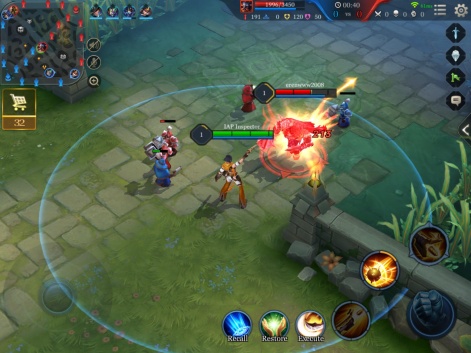Even by Chinese behemoth Tencent's high standards, League of Legends-esque mobile MOBA Honor of Kings has been a huge hit in its homeland.
The competitive title hit 50 million DAUs in January 2017, and has been pointed to as a key revenue driver for Supercell's parent company in its Q4 FY16 financials.
But now Honor of Kings has made its way to the West, soft-launched in select territories as Strike of Kings, it faces a challenge to buck the trend of underperforming mobile MOBAs.
The Western version comes equipped with a playable Batman character and seems to prioritise community building over monetisation, but does it stand a chance of following up the Chinese success of Honor of Kings? We asked our Mobile Mavens:
- After the phenomenal success of Honor of Kings in China, can Strike of Kings replicate that and bring mobile MOBAs to a significant Western audience?
After a short test play, the game looks really nice and polished. If it does not succeed, the main reason is the session length.
The minimum useful session is something like 20 minutes. That might be a far greater problem in the West than it is in China.
While maximum session lengths (time before the game nudges you to leave by running out of energy, etc.) can now be quite long for core games in the West, the minimum time that it takes to do something useful remains short.
If a game demands 20 minutes of uninterrupted time to concentrate, you can really only play it at home.Torulf Jernstrom
In fact, checking the GameRefinery data, there were only five games in the top 100 where the minimum time needed even exceeded five minutes, three of which were casino games.
The two others were Hearthstone and 8 Ball Pool.
If a game demands 20 minutes of uninterrupted time to concentrate, you can really only play it at home. And for a core gamer in the West, that means that they are in the same room with their Playstation, Xbox or high-end gaming PC.
The decision will usually be to play on those instead.
In China, a core gamer is much less likely to have a console or high-end PC at home. Therefore, they are willing to put in the 20+ minute sessions on their smartphones.
The same often goes for the casino gamers, who often are older people without dedicated gaming hardware at home. Hearthstone players, of course, can opt for the PC at home and smartphone on the go.
So, wrapping up: my bet is that it will fail to reach top 20 positions, due to differing cultures around session length. Not terribly sure about this, but I'm leaning that way.
I believe that Western audience is ready for mobile MOBAs and Strike of Kings will definitely find its audience in the West.
However, replicating success from China to that extent will be incredibly challenging, even with the DC Comics partnership.
The biggest hurdle they have to overcome is the fact that Strike of Kings offers battles that are 10+ minutes long and require substantial skill, which is a big differentiating point.
Most mobile MOBAs are competing in the three to five minute battle experience space, and are meant to be played in short bursts multiple times during the day, requiring little to no planning.
With Strike of Kings, you actually need to be conscious of time and make sure you set aside at least 15 minutes in order to be able to play one match.

Considering the controls and required focus in order to play well, you also need to be conscious of the environment in which you are playing the game and at that point you are getting into a PC MOBA territory.
Generally I believe that porting experience from PC over to mobile is a bad idea, but In China, Tencent has proven that the immersion they provide during those 15 minutes is rich enough to attract 50 million active players and change how they consume and play mobile games.
It is an amazing success story, but one that will be difficult to replicate in the West.

John is co-founder of PR and marketing company Big Ideas Machine. Also an all-round nice guy...
We've played Strike of Kings for a good few hours, and there are a lot of plus points.
It's great-looking and very engaging, but it also suffers from a few common issues - ones that are typical of Chinese games that are ported to the West.
The DC Batman license is a piece of odd shoehorning, simply being shoved into the fantasy scenario.John Ozimek
The obvious comparison as a mobile MOBA is going to be Vainglory. The main thing is how Vainglory's input uses taps to send a character over to a place, whereas Strike of Kings uses a virtual joystick which is not as quick or precise.
The UI is also hideously complex and very typical of many Chinese games.
Although it follows many Western MOBA tropes in how it works, which can be confusing in and of itself, there are still a lot of confusing sub-menus and areas.
These extra bits are simply never explained and rely heavily on guessing or perseverance on the part of the player! This is a massive barrier to entry and not as user-friendly as Vainglory.
Finally, the DC Batman license is just a piece of really odd shoehorning because he's simply being shoved into the fantasy scenario.
If the game had a raft of DC characters and a cityscape map then maybe it would work.
But sticking Batman in there to only try and appeal to comic fanboys and girls sits awkwardly with me, and smacks of a company that has very deep pockets and is making what they think is an easy play for a Western audience that they perhaps don't fully understand.
Honor of Kings (also called King of Glory - Hero MOBA in China) is currently the most successful mobile game in the entire world.
It does around $170 million gross revenue per month across iOS and Android channels in China - more revenue than Game of War and Clash Royale combined make globally.
To me, that’s just mind boggling. However, Honor of Kings has a couple things going for it that really set it up for success in China.
First is a userbase that has a long history of playing and spending in high ARPU PC games, MMORPGs and MOBAs alike.
This userbase also plays League of Legends religiously both casually and as an eSports game. They also thirst for real-time PvP gameplay which the game offers, and play long sessions on mobile.
Then there's the power of Tencent’s WeChat platform to bring in the right users, as well as good offline marketing like TV and subway ads.
While I believe a Western audience is probably ready for a mobile MOBA (Clash Royale kind of proves this out), I don’t think Tencent will achieve the same success in the West for a few reasons.
Tencent’s user acquisition strategy will be totally different in a region where WeChat is nonexistent.Devin Nambiar
First, while there have been some mobile-first changes made, the UI/UX is still fairly cluttered and complex. Chinese players are more used to this, but it will turn off non-core players in the West very quickly.
Second, Tencent’s user acquisition strategy will be totally different in a region where WeChat is nonexistent.
The DC Comics IP seems like a cheap ploy to lower CPIs and gain users, but the IP feels out of left field and doesn’t really jive with the type of player who would play and spend lots of money in a MOBA.
Lastly, while real-time PvP is virtually minimum viable product for games in China, it hasn’t gained as much traction in the West other than Clash Royale, so it will be interesting how players respond to the game mode.
Then again, people in the West play League of Legends in their droves, so for a core set of players I can see the LTV still being quite high - which may justify further investment to attempt to scale. I’m eager to try it out soon!

























